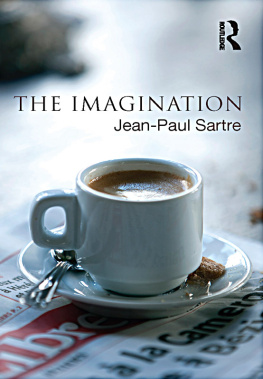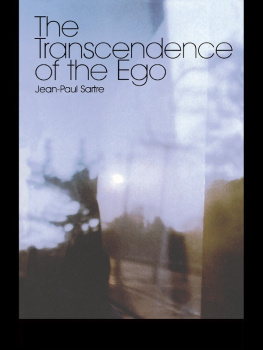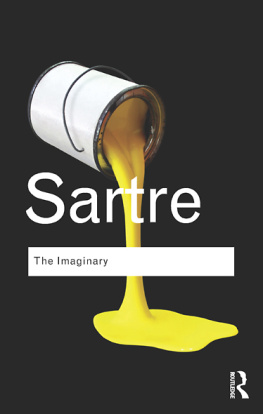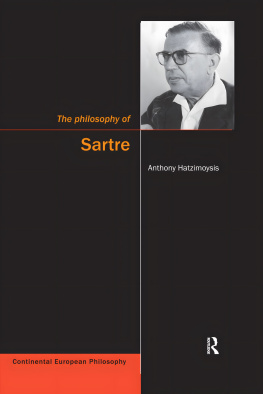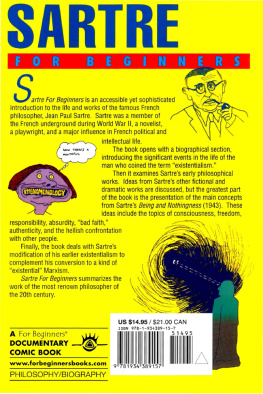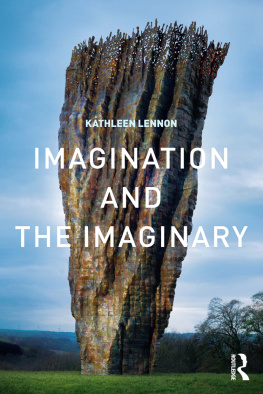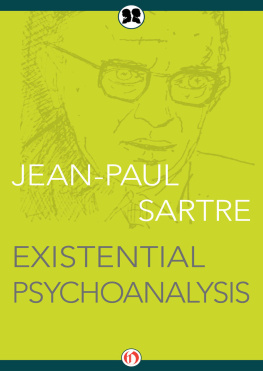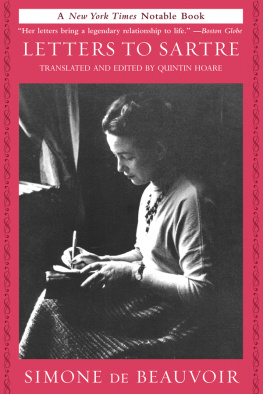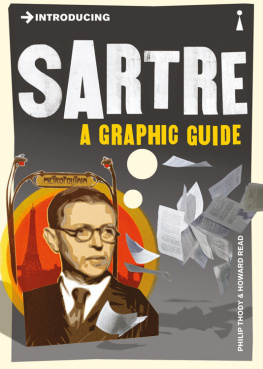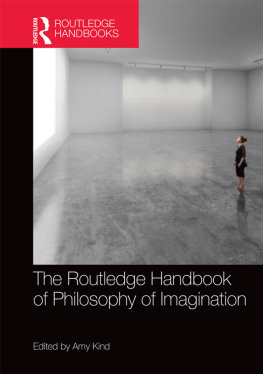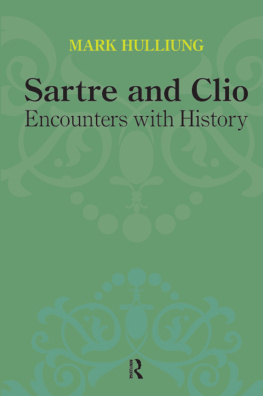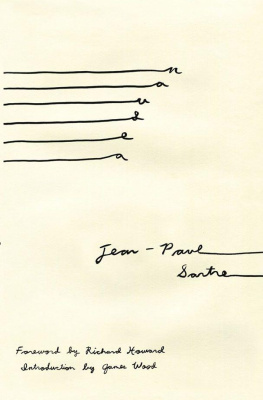Sartre - The Imagination
Here you can read online Sartre - The Imagination full text of the book (entire story) in english for free. Download pdf and epub, get meaning, cover and reviews about this ebook. publisher: Taylor and Francis, genre: Science. Description of the work, (preface) as well as reviews are available. Best literature library LitArk.com created for fans of good reading and offers a wide selection of genres:
Romance novel
Science fiction
Adventure
Detective
Science
History
Home and family
Prose
Art
Politics
Computer
Non-fiction
Religion
Business
Children
Humor
Choose a favorite category and find really read worthwhile books. Enjoy immersion in the world of imagination, feel the emotions of the characters or learn something new for yourself, make an fascinating discovery.
The Imagination: summary, description and annotation
We offer to read an annotation, description, summary or preface (depends on what the author of the book "The Imagination" wrote himself). If you haven't found the necessary information about the book — write in the comments, we will try to find it.
The Imagination — read online for free the complete book (whole text) full work
Below is the text of the book, divided by pages. System saving the place of the last page read, allows you to conveniently read the book "The Imagination" online for free, without having to search again every time where you left off. Put a bookmark, and you can go to the page where you finished reading at any time.
Font size:
Interval:
Bookmark:
The Imagination
No matter how long I may look at an image, I shall never find anything in it but what I put there. It is in this fact that we find the distinction between an image and a perception.
Jean-Paul Sartre
L'Imagination was published in 1936 when Jean-Paul Sartre was thirty years old. Long out of print, this is the first English translation in many years. The Imagination is Sartre's first full philosophical work, presenting some of the basic arguments concerning phenomenology, consciousness and intentionality that were to later appear in his master works and be so influential in the course of twentieth-century philosophy.
Sartre begins by criticizing philosophical theories of the imagination, particularly those of Descartes, Leibniz and Hume, before establishing his central thesis. Imagination does not involve the perception of mental images in any literal sense, Sartre argues, yet reveals some of the fundamental capacities of consciousness. He reviews psychological theories of the imagination, including a fascinating discussion of the work of Henri Bergson. Sartre argues that the classical conception is fundamentally flawed because it begins by conceiving of the imagination as being like perception and then seeks, in vain, to re-establish the difference between the two. Sartre concludes with an important chapter on Husserl's theory of the imagination which, despite its sharing the flaws of earlier approaches, signals a new phenomenological way forward in understanding the imagination.
The Imagination is essential reading for anyone interested in the philosophy of Jean-Paul Sartre, phenomenology, and the history of twentieth-century philosophy.
This new translation includes a helpful historical and philosophical introduction by Kenneth Williford and David Rudrauf. Also included is Maurice Merleau-Ponty's important review of L'Imagination upon its publication in French in 1936.
Kenneth Williford is Associate Professor of Philosophy at The University of Texas, Arlington, USA.
David Rudrauf is Assistant Professor of Neurology at The University of Iowa, USA.
Jean-Paul
Sartre
The Imagination
Translated by
Kenneth Williford and David Rudrauf

LONDON AND NEW YORK
This edition published 2012 by Routledge
2 Park Square, Milton Park, Abingdon, Oxon, 0X14 4RN
Simultaneously published in the USA and Canada
by Routledge
711 Third Ave, New York, NY 10017
Routledge is an imprint of the Taylor & Francis Group, an informa business
Jean-Paul Sartre, L'imagination
Presses Universitaires de France, 1936
Nouvelle Encyclopdie philosophique
6, avenue Reille, 75014 Paris
Translation Routledge, 2012
Translators' Introduction Kenneth Williford and David Rudrauf, 2012
All rights reserved. No part of this book may be reprinted or reproduced or utilised in any form or by any electronic, mechanical, or other means, now known or hereafter invented, including photocopying and recording, or in any information storage or retrieval system, without permission in writing from the publishers.
British Library Cataloguing in Publication Data
A catalogue record for this book is available from the British Library
Library of Congress Cataloging in Publication Data
Sartre, Jean-Paul, 19051980.
[Imagination. English]
The imagination / by Jean-Paul Sartre.
p. cm.
Translated by Kenneth Williford and David Rudrauf.
Includes bibliographical references (p. ) and index.
1. Imagination. I. Williford, Kenneth. II. Rudrauf, David.
III. Title.
BF408.S263 2012
248.4dc23
2012002511
ISBN: 978-0-415-77618-9 (hbk)
ISBN: 978-0-415-77619-6 (pbk)
Typeset in Joanna by RefineCatch Limited, Bungay, Suffolk
, Jean Paul Sartre

We would like to thank Jonathan Webber for his very useful feedback on an early draft of the translation and Adam Johnson and Tony Bruce for their good nature and patience with us. Sometimes it felt like our promises about the completion of the work were like so many predictions of the end of the world: it doesn't matter that the vast majority of them turn out to be false; someday, some prophet of doom will turn out to be right. And that, apparently, is motive enough for them to keep making the forecast.
We'd also like to thank Andrea Swenson for letting us take over and trash her apartment for a translation frenzy early in the process.
As is customary, the translators blame each other for any flaws remaining in this translation.
I (KW) would like to dedicate this work to the memory of Denny Bradshaw who first showed me the importance of Sartre's early phenomenological works and to Panayot Butchvarov, Denny's mentor and then my own, whose course on Sartre at The University of Iowa was the stuff of academic legend and whose philosophical breadth and depth continues to astound.
I (DR) would like to dedicate this work to my father, Jacques Rudrauf to whom I owe an understanding of a certain French intellectual tradition and discourse that was pivotal in the making of this translation.

INTRODUCTION
Kenneth Williford and David Rudrauf
SARTRE'S ANNI MIRABILES
Duly acknowledging the element of arbitrariness in all such claims, it is still fairly safe to say that the thirteen-year period stretching from September 1933, when Sartre began his nine-month residency at the Institut franais de Berlin, to the publication of Existentialism is a Humanism and Anti-Semite and Jew in 1946, stands as a truly remarkable period of productivity in the annals of philosophical and literary biography. During this period Sartre wrote and published (though not always in the order written) no less than five philosophical classics: The Imagination (1936), The Transcendence of the Ego (1937), Sketch for a Theory of the Emotions (1939), The Imaginary (1940), and Being and Nothingness (1943). Remarkable as that is, in the same period he wrote (or rewrote) and published (or premiered) no less than seven literary classics: Nausea (1938), The Wall (1939), The Flies (1943), No Exit (194445), The Age of Reason (1945), The Reprieve (1945), and The Respectful Prostitute (1946). If one thinks of other significant works published right after 1946, like The Chips are Down (1947) and Baudelaire (1947), this should serve as a reminder of the arbitrariness just mentioned.
And if one thinks of smaller, but not unimportant pieces, like Intentionality: a fundamental idea of Husserl's phenomenology (1939) and Consciousness of self and knowledge of self (1948), one will gain a still better sense of the fecundity of this period and its long afterglow. Sartre's perceived importance as a philosopher and writer has continued to wax and wane inside and outside of France, but no one who has spent careful time in the pages from his anni mirabiles can fail to be unmoved, if not fully persuaded, by his overall vision or seriously doubt his philosophical breadth and depth, the occasional interpretive or argumentative lapse notwithstanding.
THE UNEXPECTED SIGNIFICANCE OF SARTRE'S EARLY PHENOMENOLOGICAL WORKS
As academic years go by and old ideological obstructions melt into the past, we continue to witness a deepening appreciation of Sartre's early phenomenological works on the part of philosophers from many different intellectual orientations and micro-traditions inside and outside of France. Outside the home country, this development has been encouraged by new and better translations and scholarship. The interest in these works on the part of recent Anglophone philosophers of
Font size:
Interval:
Bookmark:
Similar books «The Imagination»
Look at similar books to The Imagination. We have selected literature similar in name and meaning in the hope of providing readers with more options to find new, interesting, not yet read works.
Discussion, reviews of the book The Imagination and just readers' own opinions. Leave your comments, write what you think about the work, its meaning or the main characters. Specify what exactly you liked and what you didn't like, and why you think so.

